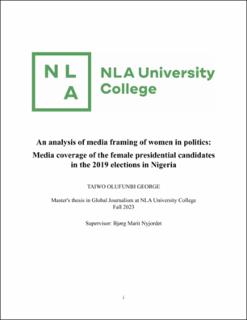| dc.description.abstract | This study aimed to critically assess how the coverage and framing of women in politics by the Nigerian media influenced women’s participation in politics, specifically during the 2019 elections. Grounded in the agenda-setting theory, mediatization of politics, and framing theory, the study aims to unravel the disparities and challenges female candidates face in the Nigerian media landscape, focusing on their portrayal, visibility, and framing across various news outlets. Employing a mixed methods approach, integrating qualitative and quantitative methodologies, the research aimed to dissect the intricate patterns of portrayal in the media. Drawing from 73 meticulously scrutinized articles from prominent Nigerian media outlets, including Punch, Vanguard, Guardian, and Daily Trust, the study probed into crucial aspects: the nature of news content, the frequency of appearance, and the visual representation through photographs. The findings revealed a stark contrast with existing literature, showcasing a minimal use of gender frames, which signifies a progressive stride towards more equitable media coverage. Despite these positive shifts, disparities persisted, with female candidates receiving noticeably less attention both in terms of text and visual representation. Female candidates were predominantly featured in political news stories, especially related to the elections, with limited coverage in general news, feature articles, and editorials with little coverage on critical issues like Education, Health, and the Environment. Still, they were mentioned in stories related to Fashion, Family, and Women's rights. Moreover, there were varying tones in articles, with a predominantly neutral tone for female candidates. This research not only challenges prevailing gender biases but also advocates for more inclusive media practices. The study calls for heightened awareness among journalists, practitioners, and policymakers, emphasizing the need for balanced, diverse, and gender responsive reporting, thus fostering a more inclusive democratic discourse in Nigerian media. Keywords: Media frames, Women, Politics, News, Media, Nigeria | en_US |
